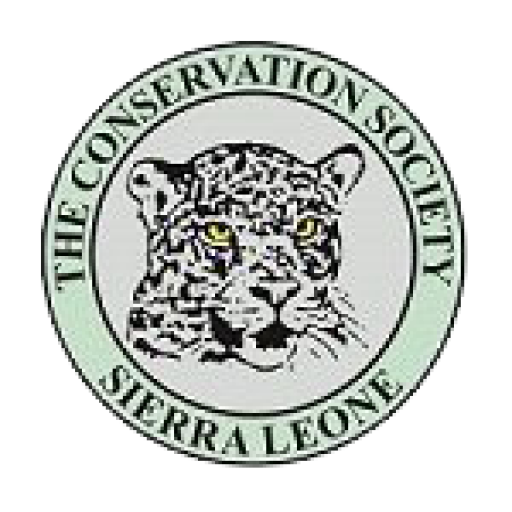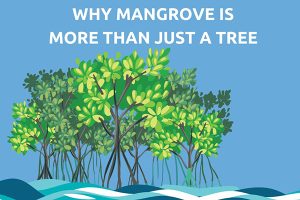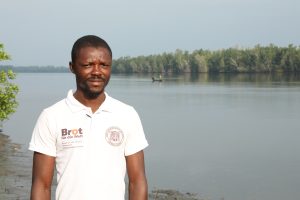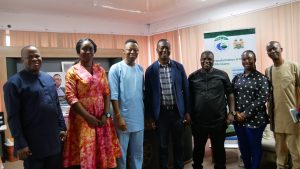The Conservation Society of Sierra Leone (CSSL) with funding from Wetland International had on the 30th of March 2023 organized a project inception workshop. The workshop brought together relevant stakeholders including Ministries, Departments and Agencies, and community stakeholders.
The project “Strengthening Stakeholders’ Capacity for Sustainable Management of Yawri Bay in Sierra Leone’s Coastal Corridor’’ aims at strengthening the capacity of stakeholders for effective management of Yawri Bay.
Madam Andrea Haffner, Project Coordinator in her presentation during the workshop mentioned that the advent of the PAPBIO project is to continue engaging the communities engaged during the CEPF project and to fill in gaps in the CEPF project such as reviving the ecosystem through restoration and establishing community advocacy champions etc. The project is also focusing on building on the gains and achievements of the concluded CEPF-supported project, to increase recognition, protection, and management of the Yawri Bay ecosystem and to ensure its sustainability through increased coordination and collaboration among the stakeholders on the conservation of the site. The main vehicle for the coordination and implementation of project activities is the Yawri Bay Ramsar Site Working Group (YaRSWoG) which constitutes 17 individuals from diverse institutions. This group will be meeting quarterly to review, approve, and advise on all planned conservation actions in the bay, she expounded.
After the presentation of the project´s objectives and planned activities, statements from different key stakeholders emphasized on the importance of the engagement of CSSL at the Yawri Bay and all speakers expressed the commitment of their respective institution or organisation to add their bid to the success of the project.
One of the 16 eco-guards trained by CSSL who is a resident of Kent, Madam Phebian Henry said: “I am really pleased to be here and to witness that the engagement of the Conservation Society of Sierra Leone (CSSL) with the communities and other stakeholders in the Yawri Bay continues’’. She further explained that between March 2021 and June 2022, CSSL engaged communities, local authorities, and government bodies in the protection of the Mangrove Forest of Yawri Bay through the CEPF project. To ensure that the achievements of the CEPF project will be sustainable, CSSL continues to be present in the area and continues to work together with the community and government to protect the sensitive ecosystems of the bay. “The training received from CSSL helped us understand the importance of mangroves and all animals living there’’. Before, we cut the mangroves without knowing the consequences. Thanks to the training we are now aware of the negative of destroying the mangroves. As eco-guards, we have been engaging other communities and have been providing some form of awareness raising from what we have already learnt from CSSL and this has been yielding some behavioural change. For example, in the past, when people caught a turtle they would rather eat it or sell it. But, because of the awareness around conservation, turtles are released when caught, though not always. It is quite obvious that behaviour change takes time and it requires people’s acceptance.
Acknowledging CSSL and the relevance of the project, Mr Victor Kargbo, Assistant Director of Fisheries and Marine Resources in charge of Marine Artisanal Fisheries reiterated the ministries’ commitment to supporting CSSL’s effort to protect the Yawri Bay and ensuring the sustainable livelihood of communities. “I am grateful to be here today and to reemphasize that we are sitting on a time bomb and that if we allow this bomb to explode, many people will lose their lives including their livelihoods’’. That’s why we really have to protect Yawri Bay, including the mangroves that provide breeding grounds for fish and other biodiversity.
Recognizing the collaborative effort of CSSL with other institutions, the Terrestrial Manager of the National Protected Area Authority, Mr Ansuma Babar Turay CSSL has been collaborative with the National Protected Area Authority in most of the implementation of their projects and that this collaboration has been very successful over the years. The effects of actions of humanity in the Yawri Bay landscape are causing a significant effect on the environment and its resources as is evidenced by the loss of fish resources posing increased fish scarcity. Protecting the livelihood of the fishing communities we have to protect the Yawri Bay ecosystem, he reiterated.
It is not only Phebian and the other eco-guards who hope that the presence of CSSL in the Yawri Bay will continue. The representatives from governments as well as from the local council, the traditional leaders and other civil society organisations are strongly supporting and welcoming the long-term commitment of CSSL.
“The meeting was a full success“ explains Abdulai Dauda, Assistant Biodiversity Officer’ after the meeting. “The stakeholders understood the relevance of the project, they gave their inputs and pledged commitment to ensure successful implementation of the project. We successfully managed to identify key sites for mangrove restoration.” In the weeks to come, more meetings including community and Yawri Bay Ramsar Site Working Group meetings will be held with key stakeholders. Despite the short duration of the project, it is anticipated that collective effort, hard work and co-management with communities will help to sustainably protect Yawri Bay.
“The future hope of CSSL is to see Yawri Bay become like Gola, fully protected and sustainably conserved – together with the communities and all other actors. This is our dream.” expressed Abdulai Dauda.



